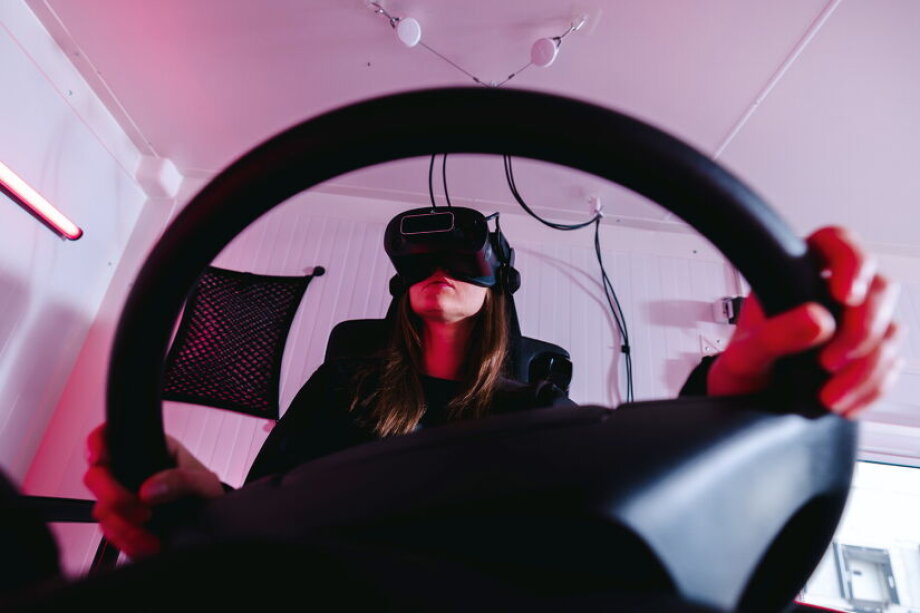Virtual reality meets real needs


To train and recruit drivers, Raben Group uses innovative technologies – VR Truck Simulator
Trying out technological innovations is an everyday occurrence at Raben Group. The fleet, warehouse infrastructure and IT systems used in the company not only meet the highest standards but in many cases set the direction for the entire industry. This is also the case with the VR Truck Simulator, an innovative device that has recently started supporting the recruitment and training of truck drivers who work on domestic and international routes every day.
Virtual reality meets real needs
VR technology itself is no longer considered a novelty. Perfected over several decades, it is most often used in the entertainment industry (in the form of realistic computer games), culture (e.g. by enabling one to “step into” the paintings of famous painters), or tourism (allowing one to “visit” monuments currently in ruins). It is all the more noteworthy that its origins (dating back to the 1950s) were in the training sector—it was when the first flight simulators were developed. From today’s perspective, we would describe them as imperfect; however, at the time, they were the only safe way to train future pilots (and later astronauts).
The Best Truck Driver project returned to its roots when constructing the VR Truck Simulator. Our experts at Raben Group discovered it while testing another product. Having seen the potential of the device, they entered into a partnership with its developers to best meet the needs of the transport and forwarding logistics (TFL) industry. Specifically, for training and testing the skills of truck drivers.
A comprehensive, safe and ecological driver’s test
Obviously, obtaining a licence to drive a truck requires knowledge and practical skills, but it is rare for a trainee to be confronted with every potentially dangerous situation during an exam, or even throughout the course of learning. In addition, an experienced driver, of 20 years, smay have developed bad habits, translating into either less safe or lessergonomic driving. The VR Truck Simulator addresses these limitations by providing a platform to test and improve driving skills in various scenarios—though not all scenarios can be predicted with certainty.
The simulator accurately depicts the interior of a Raben truck and features the original seat and steering wheel. The actuators of the platform captures the haptic experience of the ride. Observation of conditions on the virtual road is facilitated by the use of VR goggles or three LCD screens. The scenarios take into account different vehicle and road types,including motorways, urban areas and even mountain roads. Drivers have the opportunity to assess the accuracy and speed of their reactions under different circumstances, such as day and night driving, as well as in windy, snowy, rainy and foggy conditions, as well as in varying traffic volumes. The simulation also takes into account variants for moving with a semi-trailer or swap body, as well as maneuvering in parking lots and terminals.
The VR Truck Simulator can be used in many situations. It enables the creation of reliable and tailored recruitment assessments and facilitates efficient onboarding processes, introducing new drivers to the company’s specific work environment. The VR Truck Simulator is also an invaluable training tool, allowing drivers to improve their skills even under extreme conditions, without risking harm to themselves or others, without generating exhaust or noise, and without the risk of damaging expensive equipment. There’s no denying that the VR simulator is an intriguing innovation, poised to promotethe truck driving profession, which consistently faces shortages, as indicated by the Occupational Barometeryear after year.
“The VR Truck Simulator is an ideal tool for us for many reasons. Not only does it streamline work and respond to practical needs in the area of recruitment and training, but it does it in a way which is close to Raben Group’s idea of operation: innovative, ecological, economical and safe,” says Magdalena Szaroleta, Sales Director at Raben Transport.

Mobile training centre
Use of the simulator is not limited to one location. It is fitted inside a container so that it can be transported conveniently and without problems. Initially, it will serve mainly in the company’s Polish and Czech depots. However, if it proves successful (as indicated by pilot tests conducted in 2023), it is very likely that further units will be sent to other locations.
The implementation of the simulator coincided with the creation of a training team at Raben Transport, for whom the device will be a huge support. The VR Truck Simulator will allow new and experienced drivers alike to prepare for emergencies, including rare but highly dangerous situations. In real-life scenarios, while one may theoretically know the safety procedures, the speed of events can lead to confusion and stress, making it easy to forget even basic safety rules. Regular training under realistic conditions, facilitiated by the simulator, is crucial for developing coping mechanisms against stress.
However, the use of the VR Truck Simulator is not just limited to preparing drivers for road emergencies. It is also an effective tool for learning new systems and technologies used in trucks,as well as systems that are not completely new but used infrequently or incorrectly. The device will help in training drivers to drive economically and ergonomically, resulting in health, financial and environmental benefits. Thus, it can be said with confidence that the solution introduced by Raben will not only benefit the company itself, but also society as a whole.